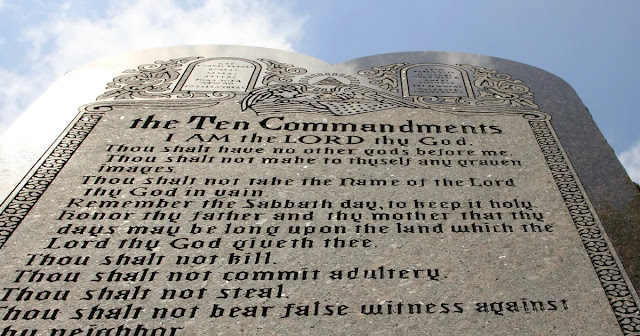A proposed monument featuring the Ten Commandments has ignited a lively debate in Amarillo, with community leaders, legal experts, and residents divided over its place in the public square. The monument, which would be privately funded through donations from local officials including Mayor Cole Stanley and members of the city council, aims to highlight what proponents argue is an important historical document.
Mayor Stanley, who has expressed strong support for the project, explained that the Ten Commandments serve as a cornerstone for American values. “Because it’s a historic document, it says what we are founded on,” Stanley said. “We are calling attention back to the foundation of our culture, not just here in Amarillo, Texas, but across the United States.”
However, the proposal has drawn sharp criticism from some residents, including Amarillo attorney Ryan Brown, who argues that placing the Ten Commandments on public property would violate the principle of religious neutrality. Brown, who has raised concerns about the project’s legal and cultural implications, pointed out that the discussion surrounding the separation of church and state dates back to the founding of the United States.
“Most of the founding fathers were deists and expressed significant skepticism of organized religion,” Brown said. “The first commandment itself says, ‘You shall have no other god but the Christian god.’ It promotes one religious view over others, and that runs counter to the inclusive values this country was founded on.”
While Stanley emphasized that the monument would be funded privately to avoid using taxpayer money, the debate continues to swirl over whether such a display on government property would be legally permissible. The mayor pointed out that similar monuments have already been installed on public grounds in several counties across the Texas Panhandle, suggesting that Amarillo would not be breaking new ground.
In contrast, Brown cited a case in Kentucky where a judge blocked the installation of a similar monument, ruling that it advanced Christianity over other religions without a secular legislative purpose. “The effect was that it advanced one religion over others, Christianity, and the purpose was not secular—it could only be construed as promoting one religion over others,” Brown said, referencing the legal precedent.
Despite these concerns, Stanley argued that the proposed monument would be inclusive rather than exclusionary. “We’re not pointing in any specific direction or eliminating anyone else,” Stanley contended. “I think the bottom line is that we don’t disagree with the intent of what the Ten Commandments represent; we disagree with the political statement people may try to make by opposing it.”
The controversy has sparked a wave of public interest, with residents of Amarillo expressing a range of opinions. The mayor reported receiving numerous calls from concerned citizens, some of whom voiced support for the monument, while others expressed dismay at what they viewed as a religious statement on public property. Stanley said he has taken the time to address the concerns of residents and has assured them that the city's legal team is carefully reviewing the proposal to ensure it does not violate constitutional principles.
Legal Considerations:
During a recent city council meeting, councilmember Les Simpson raised concerns about potential legal challenges, given the ongoing national debates over religious displays on public property. He recommended that the council consult with the First Liberty Institute, a nonprofit organization that defends religious freedoms and has been involved in numerous monument-related legal cases across the country.
Simpson emphasized that the First Liberty Institute could provide guidance to ensure the monument’s installation would be legally sound and avoid any potential lawsuits that could financially burden the city. "They have defended many monument cases, similar to this, where people were looking at taking monuments down or removing them," Simpson said. "They have said, at no cost, they would come here and be able to perhaps answer any questions and give more specific guidance."
Councilmember Tom Scherlen expressed his full support for the idea, saying, "I’m 100% behind it," while Councilmember Don Tipps also voiced his approval, stating, "I think it’s a good idea. It’s the basis of where our laws were found from, so I think it’s a good representation."
The city’s outside counsel, George Hyde, addressed concerns about the legality of placing a Ten Commandments monument at a government building, pointing to a 2005 decision by the U.S. Supreme Court that upheld the display of a Ten Commandments monument at the Texas State Capitol. Hyde suggested that Amarillo could follow similar guidelines in ensuring that the monument complies with legal precedents. "If we are mirroring the circumstances that the Texas Capitol experienced, which I understand is your intent, then it would be consistent with U.S. Supreme Court precedent," Hyde said.
Due Diligence and Legal Precautions:
Despite the strong support for the monument, the council members emphasized the importance of thorough legal vetting before any further action is taken. "Our job is not to get the city in trouble," said Tipps. "So, we’ll do it the right way. We’re going to make sure we cross the T’s and dot the I’s before it happens."
The council members also agreed that consulting with the First Liberty Institute would be a prudent step in ensuring that the installation process adheres to legal standards, and to mitigate any risk of future legal challenges. Hyde echoed Simpson's thoughts, underscoring the importance of due diligence.
As the debate unfolds, the city remains focused on navigating both the legal and cultural complexities surrounding the monument. While the project would be privately funded, the legal challenges and public sentiment surrounding the monument's placement could set an important precedent for future efforts to showcase religious symbols on public land.





%20(1).png)


%20(1).jpg)



